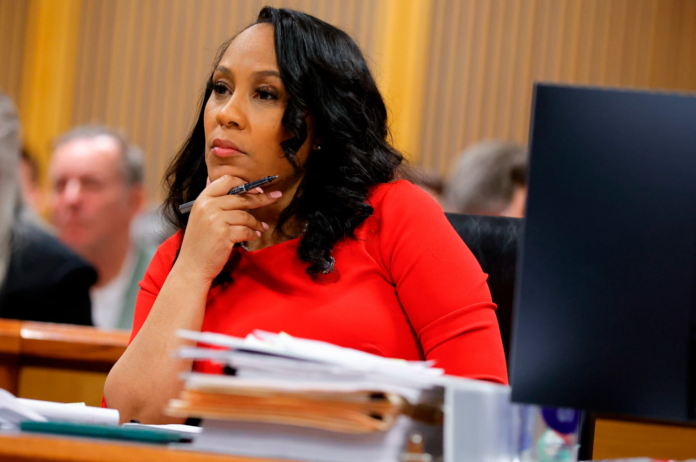Georgia judge has made a pivotal decision regarding the election interference case against former President Donald Trump. The ruling: Fulton County District Attorney Fani Willis can keep steering the ship in the prosecution against Trump, but with a significant catch. Special prosecutor Nathan Wade, whom Willis had appointed and with whom she shares a personal connection, has been instructed to step down from his role to avoid the appearance of impropriety.
This development puts a spotlight on the intricate balance of ethics and legality in high-stakes legal proceedings. Willis, facing a potential conflict of interest due to her relationship with Wade, has been given a stark choice by Superior Court Judge Scott McAfee: either Wade goes, or she must distance herself from the case—an option she’s unlikely to embrace.
The controversy stems from allegations by Trump’s legal team that the professional and personal dynamics between Willis and Wade compromised the fairness of the case. They argued that Wade’s financial ties to Willis’s office, coupled with their shared vacations and expenses, might skew his legal judgment in favor of the prosecutor’s personal interests. However, McAfee’s ruling suggests that while the situation warranted scrutiny, it didn’t necessitate Willis’s complete removal from the case. Instead, the judge pinpointed the crux of the issue as the “appearance of impropriety,” a perception challenge that needed addressing to maintain public confidence in the judicial process.
Despite this hiccup, the decision marks a setback for Trump’s defense strategy, which aimed to leverage the Willis-Wade relationship to dismiss the case entirely. McAfee’s analysis concluded that Trump’s team hadn’t sufficiently demonstrated how this relationship posed a significant enough conflict of interest to warrant such a drastic measure. This means that while the defense managed to shift some public attention towards Willis and away from Trump, the core allegations concerning Trump’s efforts to undermine Georgia’s 2020 presidential election results remain in play.
The timing of this judicial decision is critical, as Trump faces not just this legal battle in Georgia, but three additional criminal cases, including two at the federal level. Each case, with its unique set of delays and legal maneuvers, illustrates Trump’s overarching strategy to stall proceedings, potentially pushing them past the 2024 presidential election.
Earlier in the week, McAfee handed Trump a minor pre-trial victory by dismissing six of the 41 indictment charges, including two tied to Trump’s notorious phone call with Georgia Secretary of State Brad Raffensperger. Yet, this win was not an endorsement of Trump’s innocence but a critique of the prosecution’s charge specificity. McAfee’s decision leaves the door open for Willis to reconvene a new grand jury or appeal, although either path would introduce further delays into the case’s progression.
Despite these challenges, a significant portion of the indictment charges against Trump remains untouched, allowing Willis to press forward. This ongoing saga not only underscores the complexities of high-profile legal battles but also reflects the broader tensions and divisions playing out across the American political landscape.
As the case continues to unfold, all eyes are on Georgia, where the outcome could have profound implications for Trump’s political future and the integrity of the U.S. electoral system. The judicial juggling act between ethics, legality, and public perception in this case is a compelling narrative that speaks to the heart of America’s democratic principles and the rule of law.



